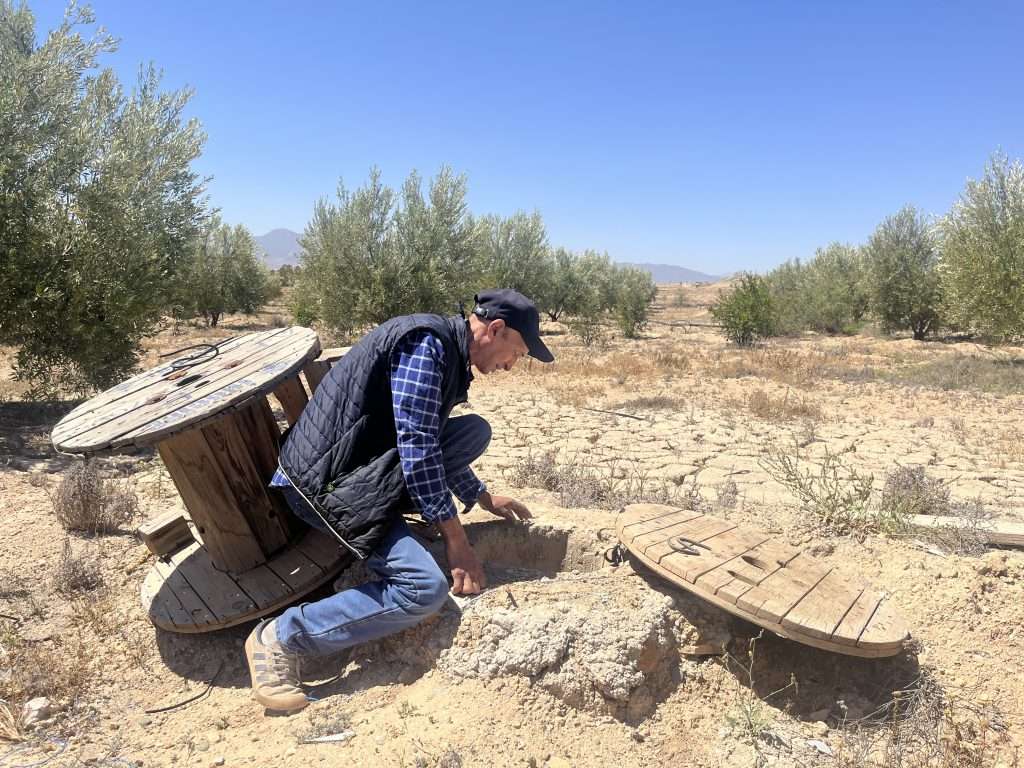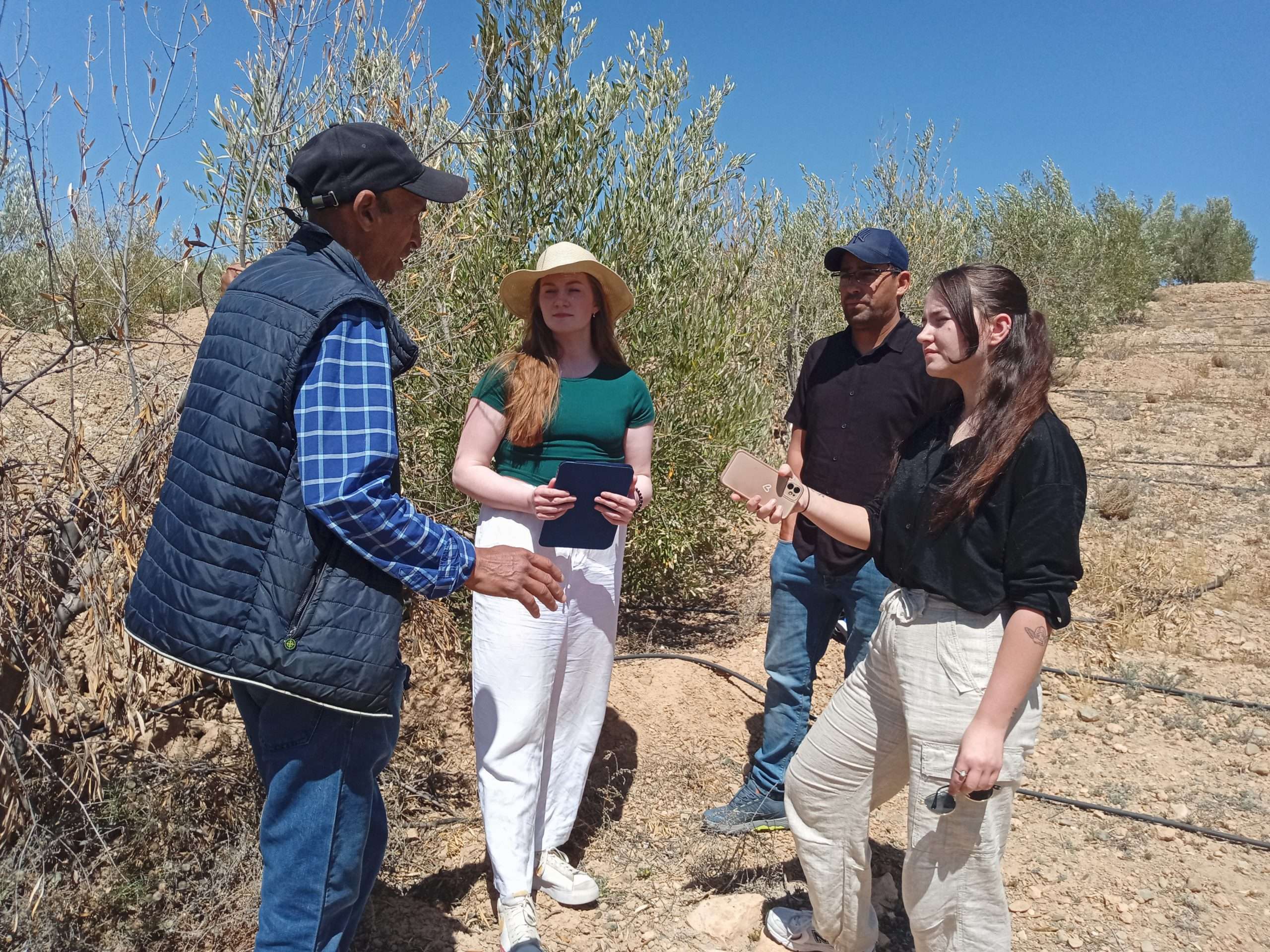Morocco’s drought devastates politically isolated olive farmers

While Morocco’s citrus farms – which are typically owned by the wealthy elite – thrive during the relentless national drought, the country’s humble olive farmers struggle to squeeze any produce from their last surviving groves. One spoke candidly to Maghrebi about the impact of a six year drought on his life
About 8 years ago, olive farming was a hugely profitable career: the reservoir was full, leafy green branches were clad with armfuls of olives, and the temperate climate showered rain in adequate intervals to keep the fruit flowing. Now, the olive farmer’s job description reads more like a eulogy: maximum effort for minimum or no payoff, extremely low profits, and little to no help from the nation’s authorities. Many olive farmers have given up the groves and have been forced to find jobs in the city to support themselves and their families; how many others have to suffer the same fate before the authorities decide to help?
Aziz, an olive farmer at the end of his tether spoke to Maghrebi about the effects of Morocco’s devastating six-consecutive-year long drought on his career and livelihood.
READ: Al Nour: Accessibility in Morocco powered by design
As I stepped out of the car after arriving at Aziz’s olive groves, after a 30 minute drive from Marrakech, I heard the crunch of a brittle olive branch below my feet. The blistering sun stung our faces as we shook hands over cracked dry soil and said our ‘hellos’ beside the house where his family used to live. Aziz gestured for us to follow him further into the plantation to higher ground to point out the small corner of trees he has any hope of saving, a fraction of his original allotment of 2,500 across 12 hectares. We walked over a drip irrigation system that was acting as life support for the majority of the surviving trees, feeding them water drop by drop. While it’s enough to keep them alive, the trees need significantly more to produce any olives. We stopped beside the skeletal trees in the 36 degree heat to find out more about Aziz’s situation.
“The drought has affected me greatly…I used to get help from the government but not anymore” he explained via a translator. “They’ve stopped giving me money and they won’t give me permission to dig new wells for water on my property…they keep telling me to just dig deeper in the wells I have but they are all so dry…there is nothing left.
Aziz then revealed that normally insurance would reimburse farmers for the damage the drought has caused, but he did not take the insurance as he could not predict the extent of the devastation on his olive trees.
As we made our way to see the few olive trees that remain vaguely healthy, we passed by the small rainwater reservoirs Aziz has. Both were nearly completely dry. Aziz reckons that he and his trees can last one more year in drought, and unless something drastically changes his days in the groves will be soon over.
“The drought has affected me greatly…I used to get help from the government but not anymore” he explained via a translator. “They’ve stopped giving me money and they won’t give me permission to dig new wells for water on my property…they keep telling me to just dig deeper in the wells I have but they are all so dry…there is nothing left
What seems bitterly unfair is that citrus farmers in Morocco are expecting to produce 3% more tangerines and 14% more lemons and limes than last season – despite the fact that citrus fruits require gallons more water to grow than olives do. A report from CitrusIndustry.Net discloses that the reason behind the millions of metric tons of limes, lemons, mandarins, and tangerines is due to the “intensified irrigation efforts aimed at mitigating the negative impacts of heatwaves on crops.” However, when asking Aziz about the citrus farmer’s success, he hinted that it was more to do with the farmers’ political connections rather than drought-defeating strategies.

“For the people who grow oranges, they have certain possibilities…they can dig deeper into wells whereas I can only dig up to 200 metres down” he told Maghrebi. “They have the financial means, the political connections, and know the right people…Power is power”.
Aziz is at a disadvantage, not because of the crop he harvests but because he does not have connections who are willing to award him permissions, grants, or favours. Many other farmers throughout the country find their wheat yields failing or their fruit and vegetable crops wilting before their eyes – which is a rapidly rising threat to Morocco’s food security in the near future.
READ: Martin Jay: Morocco is about to lose the UK as a strategic partner
Government has a plan
Last year, Moroccan authorities promised to “work to reduce the pressure on citizens”, and proposed a seawater desalination plant in Casablanca. But the trouble is that the 300 million cubic meters of water the plan would allegedly desalinate – that is needed immediately – will take until 2027 to be ready. By that time, Morocco will have suffered a decade of minimal food production and a severe loss of small farmers. The desalination process is not eco-friendly either, as concentrated salt water and other toxic chemicals can be released back into the ocean, which would threaten marine life significantly.
The Ministry of Agriculture hosted the International Agriculture Fair in Meknes from 22nd-28th April to demonstrate their resilience to climate change and their efforts towards sustainability. Although, all of the showcased fruit and fertiliser did not change the fact that rainfall frequency fell nearly 70% during 2023.
An article with interactive satellite images from NASA, by the BBC demonstrates the frightening difference in water level between 2018-2024 for Morocco’s second largest dam, Al Massira. Dr William Fletcher, a geographer from the University of Manchester shared that his research found that Morocco’s freshwater systems were “crossing thresholds” due to the increased meltwater coming from mountain tops. Furthermore, he has discovered from pollen records that the Atlas cedar trees – a species that has survived in Morocco since “the last ice age” – now face extinction.
So, what can be done?
It is as the UK’s Chief Scientist of the Environment Agency, Dr Robert Bradburne says the complex nature of drought means we must approach it from all sides. Drought isn’t just physical – it also elicits a social response.” And it appears that only the government can influence real change or any kind of solution. For Aziz, he says that he’d like more equipment, more funding, and permission to dig for water on his own land. Perhaps the solution would be for the government to keep its hand extended and offer olive branches to the farmers like Aziz and even meet them halfway instead of prioritising the wants of the uber-rich.
Reuters/BBC/CI
Want to chase the pulse of North Africa?
Subscribe to receive our FREE weekly PDF magazine










